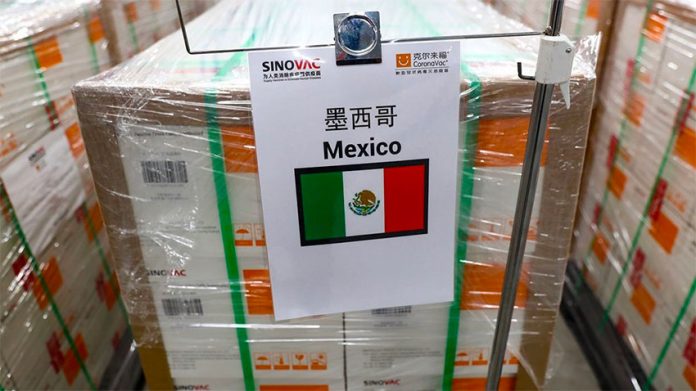A shipment of 800,000 Covid-19 vaccine doses that arrived last Saturday has not been used and remains in storage because it was not accompanied by the necessary paperwork to certify the quality of the shots.
Ruy López, director of the National Center for Disease Prevention and Control Programs, said Sunday that the government was waiting for the Chinese pharmaceutical company Sinovac to deliver documentation of the analytical tests that confirm the quality of the doses.
He said the documents were expected to arrive this week and that as soon as they do the vaccines will be released from storage and distributed across the country. As of Thursday morning, that had not happened.
Gilberto Castañeda, a pharmacology researcher at the National Polytechnic Institute’s Center for Research and Advanced Studies, told the newspaper Reforma that failing to send the analytical test results with the vaccine doses was a serious oversight.
“It’s strange that the product has arrived and that all the information that justifies its use hasn’t,” he said.
“They can’t release [the shipment] until the analytical tests arrive, … it’s just a sheet of paper,” Castañeda said.
According to the Health Ministry, the 800,000 Sinovac shots will be used to inoculate seniors in 623 rural municipalities across the country. Health Minister Jorge Alcocer expressed confidence that they would be distributed this weekend.
The shipment of Sinovac shots that arrived last Saturday was the second consignment of the Chinese-made vaccines to reach Mexico. A first shipment of 200,000 doses arrived on February 20 and was used to inoculate seniors in Ecatepec, México state.
The government announced on February 10 that health regulator Cofepris had granted emergency use authorization to the two-shot Sinovac vaccine, which has been shown to have an efficacy rate of just over 50%.
The Sinovac vaccine is one of four Covid-19 vaccines to have arrived in Mexico, all of which must be administered in two separate shots. The others are the Pfizer/BioNTech, AstraZeneca/Oxford University and Sputnik V vaccines.
As of Wednesday night, Mexico had received just under 4.7 million vaccine doses and administered 2.63 million of them, according to Health Ministry data. About 51% of the shots have gone to health workers, 48% to seniors and 1% to teachers.
More than 572,000 health workers have received both required vaccine doses as have over 17,000 teachers. None of the 1.26 million seniors who have received one shot has received a second jab.
The government has agreements to acquire 232 million mainly two-shot vaccine doses and more than 100 million are expected to arrive before the end of May.
Meanwhile, Mexico’s accumulated coronavirus case tally rose above 2.1 million on Wednesday with 7,793 new cases reported. The official Covid-19 death toll increased to 188,044 with 857 additional fatalities registered.
Source: Reforma (sp)
